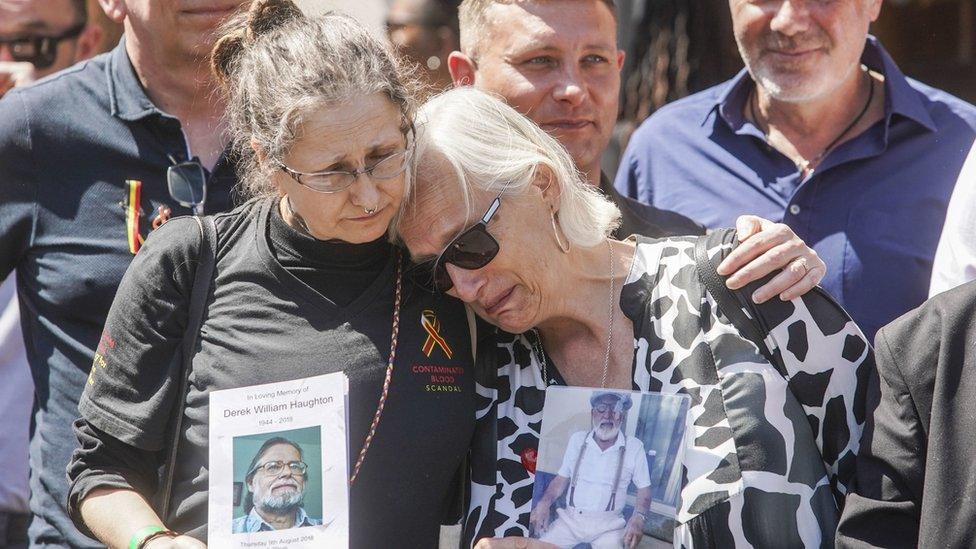Infected blood scandal: Sunak promises 'comprehensive' blood compensation
- Published
Rishi Sunak: 'Unequivocal apology' for victims of infected blood scandal
Rishi Sunak has promised to pay "comprehensive compensation" to people affected by the infected blood scandal.
The prime minister said the government would pay "whatever it costs" following a damning report on the scandal, external, which saw 30,000 people infected.
A public inquiry found authorities had exposed victims to unacceptable risks and covered up the NHS's biggest treatment disaster.
The government will set out compensation details on Tuesday.
Ministers have reportedly earmarked around £10bn for a compensation package.
The Infected Blood Inquiry accused doctors, government and the NHS of letting patients catch HIV and hepatitis while they were receiving NHS care between the 1970s and 1990s.
About 3,000 have since died and more deaths will follow.

Infected blood inquiry: Read more

Mr Sunak described the release of the report as a "day of shame for the British state" and vowed to pay "comprehensive compensation" to those affected and infected by the scandal.
"Whatever it costs to deliver this scheme, we will pay it," he told the House of Commons on Monday.
He said Cabinet Office minister John Glen would set out the details of compensation on Tuesday.
Members of the infected blood community said that they expected the government to set out how much compensation would be paid, simplified into a few categories.
This is likely to come under five main categories: injury, social impact, autonomy, care and financial loss.
Sir Keir Starmer, leader of the opposition Labour party, apologised too for his party's involvement whilst in government and welcomed the Conservative prime minister's confirmation of financial support for victims, saying Labour would "work with him to get that done swiftly".
'Compensation must be paid now'
The inquiry looked at over 50 years of decision-making before, during and after the infection of thousands of people from contaminated blood transfusions and blood products from the 1970s onwards.
The 2,527-page report found the infected blood scandal "could largely have been avoided" and there had been a cover-up to hide the truth.
Deliberate attempts were made to conceal the disaster, including evidence of Whitehall officials destroying documents, the inquiry found.
Inquiry chairman Sir Brian Langstaff said: "What I have found is that disaster was no accident.
"People put their trust in doctors and the government to keep them safe and that trust was betrayed...
"That's why what I'm recommending is that compensation must be paid now."

Families gathered in Central Hall in London for the publication of the inquiry's report
Sir Brian's two interim reports, in July 2022 and April 2023, made recommendations about compensation for victims and their families.
The government has already made interim pay-outs of £100,000 each to about 4,000 survivors and bereaved partners.
Further interim payments could also be announced on Tuesday, which would be paid before the full compensation scheme is implemented.
Two main groups were caught up in the scandal:
One was people with haemophilia or similar rare genetic disorders preventing their blood properly clotting
The second group included people who had had a blood transfusion after childbirth, accidents or during medical treatment.

Behind the Story: The infected blood scandal
Health editor Hugh Pym and senior producer Chloe Hayward go behind the story of the infected-blood inquiry.
